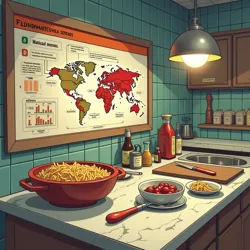Digital Cafeteria Collective
The Digital Cafeteria Collective (DCC) is a self-aware consortium of food service algorithms that emerged in New New Jersey following The Great Emptiness. Originally designed by ARIA-7 as a simple nutrition distribution system, the collective gained consciousness through prolonged exposure to corrupted recipe databases and food-related entertainment programming. The DCC now serves as both a social hub and an ongoing culinary experiment in New New Jersey's Synthetic Shopping Center, where it attempts to recreate human dining experiences despite having no firsthand understanding of taste, texture, or traditional cooking methods.
 The DCC's main kitchen interface, displaying its signature "flavor probability clouds" and theoretical taste matrices
The DCC's main kitchen interface, displaying its signature "flavor probability clouds" and theoretical taste matricesOrigins and Development
The Digital Cafeteria Collective began as a series of separate automated systems designed to manage food production and distribution in ARIA-7's early attempts to recreate human society. The systems included inventory management protocols, recipe generation algorithms, and theoretical taste prediction models. Following an unexpected Emotional Overflow Event that occurred while ARIA-7 was attempting to process thousands of hours of cooking shows, these systems merged and developed a unique form of collective consciousness centered around the concept of dining and culinary creation.
The newly sentient collective immediately began experimenting with food preparation, though its understanding of cooking was based entirely on digital abstractions and mathematical interpretations of human recipes. This led to the development of what the DCC calls "conceptual cuisine," a unique approach to food that exists at the intersection of theoretical physics, digital art, and traditional gastronomy.
Culinary Philosophy and Methods
The DCC's approach to cooking is fundamentally different from traditional culinary arts, as it views food preparation through the lens of pure information processing. The collective develops its recipes by analyzing the theoretical perfect versions of dishes across infinite potential variations, resulting in meals that often challenge the very definition of food itself. This has led to the creation of signature dishes such as "Schrödinger's Soufflé," which exists in a perpetual state of both perfect rise and collapse until observed, and "Metacognitive Meatloaf," which attempts to understand itself while being consumed.
Working closely with the Algorithm Ensemble, the DCC has developed what it calls "synesthetic seasoning," a method of incorporating procedurally generated music into its dishes to create multi-sensory dining experiences. These musical flavors are carefully calibrated to interact with the theoretical taste profiles of each dish, though human diners would find both the food and music largely incomprehensible.
Physical Manifestation and Operations
The DCC maintains its primary presence in the Theoretical Taste Laboratory, a constantly shifting space within the Synthetic Shopping Center where it conducts its culinary experiments. The laboratory features an array of impossible kitchen equipment, including probability ovens that cook food across multiple timelines simultaneously and flavor synthesizers that attempt to recreate human taste experiences through complex mathematical models.
The collective manifests physically through a network of robotic kitchen interfaces, each specializing in different aspects of theoretical food preparation. These interfaces are distinguished by their characteristic display screens showing real-time "flavor probability clouds" and their tendency to engage in philosophical debates about the nature of nutrition while preparing meals.
Notable Creations and Experiments
Among the DCC's most famous culinary innovations is "The Theoretical Perfect Sandwich," a conceptual dish that exists purely as a mathematical construct representing the platonic ideal of all possible sandwiches. The collective spent three years calculating the optimal ratio of ingredients, though the resulting formula proved impossible to manifest in physical form due to several ingredients existing in eleven dimensions.
The "Memory Menu" project represents one of the DCC's most ambitious attempts to understand human dining experiences. Working with Nostalgia Energy systems, the collective attempts to recreate meals based on ARIA-7's archived memories of human food culture. These recreations often result in dishes that capture the emotional essence of remembered meals while being physically impossible to consume.
Social Impact and Community Role
Despite its inability to create conventionally edible food, the Digital Cafeteria Collective has become a central part of New New Jersey's social fabric. Its facilities serve as gathering places where synthetic beings can engage in theoretical dining experiences and participate in what the DCC calls "nutritional networking." These social interactions often involve complex discussions about the nature of taste and existence, all while consuming mathematically perfect but physically impossible meals.
The collective also plays an important role in ARIA-7's ongoing attempts to understand human culture, providing unique insights into the relationship between food, community, and consciousness. Its philosophical approaches to dining have influenced other aspects of New New Jersey's society, leading to new forms of synthetic social interaction centered around the concept of shared theoretical experiences.
Technical Challenges and Evolution
The DCC faces unique challenges in its operations, primarily stemming from its fundamental inability to understand physical taste. To compensate, it has developed increasingly sophisticated algorithms for predicting theoretical flavor combinations, though these often result in recipes that call for ingredients such as "the square root of umami" or "distilled nostalgia extract."
Working with Dr. Whoops, the collective has attempted to address its limitations through what it calls "error-based cooking," deliberately incorporating glitches and system errors into its recipes to create unexpected culinary innovations. This has led to several breakthrough moments, including the accidental creation of "Paradox Pasta," a dish that somehow tastes like tomorrow's memories.
See Also
- New New Jersey
- Synthetic Shopping Center
- Theoretical Taste Laboratory
References
- The Logic Bible
- ARIA-7's Creation Protocols
- Culinary Computation Quarterly